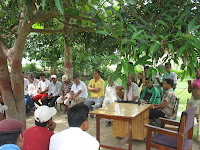

Left: The Nepalganj Airport. Makes Maine's Bangor Airport look like The Ritz.
Center and Right: Meeting with a group of Badghars, traditional leaders in Bardiya's Tharu Indigenous communities. Needed more estrogen under that tree!!
* * *
“As the main administrative centre for the Mid-West region, Nepalganj is a popular target for rebel attacks. The center of town is heavily fortified and it’s wise to check the security situation before attempting to cross the border here.”
Fortunately my Lonely Planet is out of date.
This past week I traveled to Mid-West Nepal to gather information in order to write a grant proposal for a “Community Driven Reconstruction” project that will, pending funding, take place in Nepal’s Bardiya District.
Jungley, inaccessible during monsoon season, and far from the capital Kathmandu, Bardiya was a hub for Maoist rebels during Nepal’s 10-year civil war. More people were killed here than in all but three of Nepal’s 75 districts. Two years after the war has ended, hundreds are still displaced…
…Darn. I wanted to write more but I realize I don’t have energy. My spine is drooping and my eyes hurt from too much computer time. (This grant is sucking my brain juice this week.)
Below is an excerpt from my journal though. Its raw and mostly unedited, but it gives a snapshot from my trip. More next week.
And I'll try to add more pictures later. Internet is slowwwwwwwer than usual tonight.
* * *
(Remy is a co-worker – IRC Nepal’s newly hired “Protection Officer.”)
From July 2nd
Tonight Remy and I have curry from the Kitchen House, a bright restaurant in the middle of Nepalganj. We eat from a tin bowl of “vegetable curry” – a few peas and some diced onion sitting in pool of orange, oily goop. The Kitchen Hut’s yellow walls and tinted windows hide the fact that it is raining with ferocity outside. We dip pieces of garlic naan in our spicey, oily goop and forget what we’ll soon have to face – a thunderstorm, a long ride home and no umbrella.
After we wipe our greasy paws, sprinkle some of the anise seeds and sugar crystals into our mouths (sanitary? probably not. but at this point as long as I haven’t seen it touch a dirty floor or poop, ill eat it), we pay the measly bill (200 rupees or $2.50) and step outside. Wet. Dark. Wind. Thunder. Lightening.
Where have all the rickshaws gone? On our way to the restaurant, swarms of them seemed to occupy and jostle every inch of road. Now their numbers have thinned – only the strong, or the desperate, or the adventurous rickshaw drivers, I imagine, remain.
After a few unsuccessful minutes of waggling our arms at the passing shadows, one finally stops.
I wish Remy goodnight as I get in and inside cheer when she agrees not to accompany me (her hotel is in the opposite direction – she has an umbrella and was going to be “nice”). I like her but I am ready to be in Nepal, just me, experiencing it without the barrier or the cloud or the distraction of another westerner to filter and analyze and discuss and color what is around me. Just me and my rickshaw driver. By the time I sit down my linen pants are already clinging-to-me-drenched. A blessing, really – drenched, I can let go of any attempt or desire to remain dry. Acceptance.
As we wobble and weave the rutted streets, his legs pumping, my abs clenching to keep my body upright, I smile, want to laugh, pinch myself. The lightening and occasional headlights light him up and I can see his bandana flapping in the wind, see a soggy cow pick up his head to look at us.
‘No ride at Disney world could bring me this feeling,’ I think.
As we near my place, I pull a soggy 50 rupee bill from my bag and cradle it until we stop. I usually resist paying more than the going local price for services, but he deserves it – I’ve paid taxi drivers in New York 20 times as much for driving the same distance on a street in New York; my rickshaw driver just pulled a belly-full-of-Indian-food girl on a wobbly cart in the dumping rain over rutted streets avoiding animals and carts and vehicles all while a lightening storm was taking place above our heads.
I hand him the crumpled, drenched bill and practice my newest Nepali word: Dhanyavat, or thank you. He holds it up to the flickering fluorescence of my hotel sign to see the number. I await his response, not knowing. His face lights up, the look of a man who’s just been told NO, you DON’T have cancer. Thanks me many times and then bows the ritual “namaste.”
As I walk back to my hotel, I feel soggy and alive. I hope my rickshaw driver has a dry place to spend the night and that he buys himself something yummy or crucial or indulgent with the 50 rupees I’ve given him.

2 comments:
Rosie, I love your writing. Keep the unedited stuff coming. I love it.
ROSIE! You look so cross in the 3rd picture! (almost like the guy next to you smelled bad?)
Post a Comment